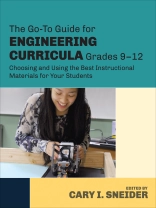How to engineer change in your high school science classroom
With the implementation of the Next Generation Science Standards, your students won’t just be scientists—they’ll be engineers. But that doesn’t mean you need to reinvent the wheel. Respected science educator Cary Sneider has done the groundwork for you, collecting a full range of time-tested curriculum materials to seamlessly weave engineering and technology concepts into your math and science lessons.
In this volume, you’ll find descriptions of instructional materials specifically created for—and tested in—high school science classrooms. Features include:
- A handy table that takes you straight to the chapters most relevant to your needs
- In-depth commentaries and illustrative examples that demystify engineering curricula at the high school level
- A vivid picture of what each curriculum looks like in the classroom, the learning goals it accomplishes, and how it helps address the NGSS
- More information on the integration of engineering and technology into 21st-century science classrooms—and why it will make a difference
One of the most well-respected science educators in the country, Cary Sneider was an NGSS Writing Team Leader and is an associate research professor at Portland State University.
Table of Content
Foreword – Janet Kolodner
Introduction – Cary Sneider
Technology and Engineering in Middle School Standards – Cary Sneider
Acknowledgments – Cary Sneider
1. The INSPIRES Curriculum – Julia Ross
2. Active Physics – Arthur Eisenkraft
3. Active Chemistry – Amy Murphy
4. Engineering the Future: Science, Technology, and the Design Process – Cary Sneider
5. Engineer Your World: Engineering Design and Problem Solving – Cheryl Farmer
6. Global Systems Science – Alan Gould
7. Science and Global Issues: Electricity – Global Energy and Power – John Howarth & Janet Bellantoni
8. Engineering by Design High School Courses – Greg Strimel
9. Science by Design: Construct a Boat, Catapult, Glove, and Greenhouse – Lee Pulis
10. Nature′s Designs Applied to Technology – Susan Riechert
11. Voyages Through Time and the Evolutino of Technology – Edna De Vore & Pamela Harman
12. EPICS High Program – William Oakes, Mindy Hart, Jean Trusedell, & Philip Cardella
About the author
Cary Sneider is Associate Research Professor in the Center for Science Education at Portland State University in Portland, Oregon, where he teaches research methodology to teachers in a Master’s degree program. In recent years he served the National Research Council as design lead for technology and engineering to help develop A Framework for K-12 Science Education: Practices, Crosscutting Concepts, and Core Ideas, which has provided the blueprint for Next Generation Science Standards (NGSS). He then played a similar role on the writing team to produce the NGSS, which was released in April, 2013. The recognition that teachers would need access to instructional materials to help them meet the new standards led Cary to develop the current volume, Engineering Curricula Ready to Go!Cary was not always interested in engineering—or at least he didn’t know that he was. For as long as he can remember he was interested in astronomy. He read all he could find about it, and when he was in middle school his father bought him a small telescope. In high school Cary built his own telescopes, grinding mirrors and designing and building mountings. All this time he thought he was doing science. Today, he recognizes that like many scientists, he especially enjoyed the engineering part of the work. During his junior year at college Cary had an opportunity to teach at an Upward Bound program, and found that he enjoyed teaching even more than research in astronomy. In subsequent years he taught science in Maine, Costa Rica, Coalinga California, and the Federated States of Micronesia. He returned to college, this time to obtain a teaching credential and eventually a Ph D degree in science education from the University of California at Berkeley. He spent nearly thirty years in Berkeley, developing instructional materials and running teacher institutes at the Lawrence Hall of Science. He spent another decade as Vice President at the Museum of Science in Boston, where he developed a high school curriculum called Engineering the Future, and finally moved to Portland, Oregon, to be closer to children and grandchildren. Over his career Cary directed more than 20 federal, state, and foundation grant projects, mostly involving curriculum development and teacher education. His R&D interests have focused on helping students and museum visitors unravel their misconceptions in science, on new ways to link science centers and schools to promote student inquiry, and on integrating engineering and technology education into the K-12 curriculum. In 1997 he received the Distinguished Informal Science Education award from NSTA and in 2003 was named National Associate of the National Academy of Sciences for his service on several National Research Council committees.












